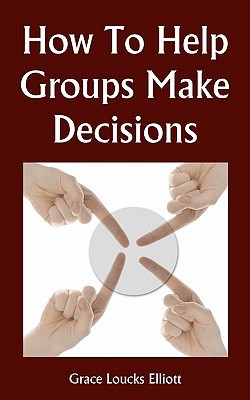
- We will send in 10–14 business days.
- Author: Grace Loucks Elliott
- Publisher: CreateSpace Independent Publishing Platform
- Year: 2011
- Pages: 66
- ISBN-10: 143827095X
- ISBN-13: 9781438270951
- Format: 12.7 x 20.3 x 0.4 cm, softcover
- Language: English
- SAVE -10% with code: EXTRA
Reviews
Description
Sooner or later most of us become presidents, chairmen, or leaders of clubs, committees, boards, or other small units in the social, religious, educational, recreational, and civic activities that enroll a large proportion of the population in every community. These groups are forever faced with situations to work out, decisions to make that deal with an extraordinary variety of matters. An enormous amount of business is thus transacted. That is the way our common life is and that is the way we like it. Things would be very different, were we to do away with this great volume of grass-roots self-government. When it turns out that these decisions have been made well, everyone is pleased, though the group members may not have been in full agreement when the decisions were made. Frequently the decisions prove to be wrong or unwise, even when the group has seemed to be in full agreement. When this happens, faith in democratic processes may be weakened. The remark that a camel is a horse put together by a committee is not a very accurate judgment on group decisions in general, but it describes what happens too often. Fortunately, ways are known for helping groups to come to surer, wiser, sounder decisions. How to Help Groups Make Decisions is for the use of chairmen, presidents, discussion leaders who have this responsibility. Like anything else, the skill that chairmen and leaders of groups need, can be learned. A better grasp of the proved methods of working together will make it possible for them to help members of clubs, churches, social agencies, and citizens in the community, the nation, and the world to participate more intelligently and wholeheartedly in matters of concern to them and to society.
- Author: Grace Loucks Elliott
- Publisher: CreateSpace Independent Publishing Platform
- Year: 2011
- Pages: 66
- ISBN-10: 143827095X
- ISBN-13: 9781438270951
- Format: 12.7 x 20.3 x 0.4 cm, softcover
- Language: English English
Sooner or later most of us become presidents, chairmen, or leaders of clubs, committees, boards, or other small units in the social, religious, educational, recreational, and civic activities that enroll a large proportion of the population in every community. These groups are forever faced with situations to work out, decisions to make that deal with an extraordinary variety of matters. An enormous amount of business is thus transacted. That is the way our common life is and that is the way we like it. Things would be very different, were we to do away with this great volume of grass-roots self-government. When it turns out that these decisions have been made well, everyone is pleased, though the group members may not have been in full agreement when the decisions were made. Frequently the decisions prove to be wrong or unwise, even when the group has seemed to be in full agreement. When this happens, faith in democratic processes may be weakened. The remark that a camel is a horse put together by a committee is not a very accurate judgment on group decisions in general, but it describes what happens too often. Fortunately, ways are known for helping groups to come to surer, wiser, sounder decisions. How to Help Groups Make Decisions is for the use of chairmen, presidents, discussion leaders who have this responsibility. Like anything else, the skill that chairmen and leaders of groups need, can be learned. A better grasp of the proved methods of working together will make it possible for them to help members of clubs, churches, social agencies, and citizens in the community, the nation, and the world to participate more intelligently and wholeheartedly in matters of concern to them and to society.


Reviews